
|
||
|
Portland art blog + news + exhibition reviews + galleries + contemporary northwest art
|
||
Remote Events and Vanished Objects at PSU 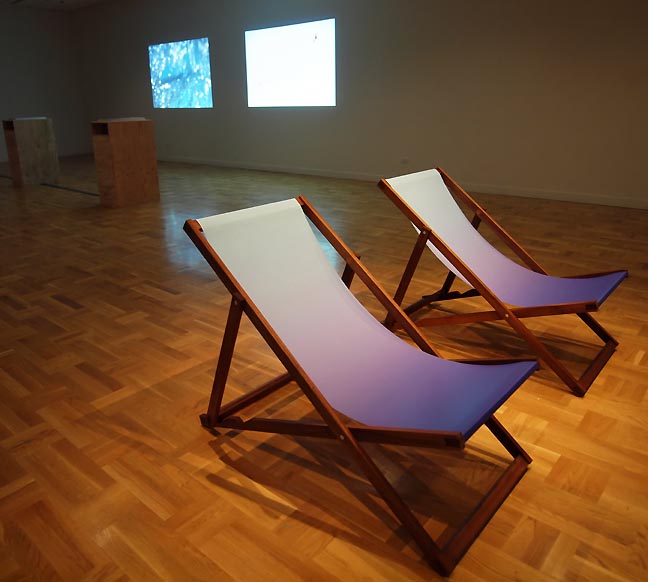
Remote Events and Vanished Objects (Installation View) This year, the Portland art scene's summer season is populated with many surprisingly tepid group shows yet somehow, Kyle Thompson and Caitlin Ducey's Remote Events and Vanished Objects at PSU harnesses the Northern Hemisphere's sunny season and bonheur de vivre with panache. The fact that everything on display seems emotionally distant and or actually directing our attention towards a place unknown and far away only re-emphasizes its sense that the gallery goer should be planning what to do when they get back outside into the sun and it is this existential negation of the gallery's built environment that makes this show stand out. Sparse and visually rewarding, the installation at Portland State University's Littman Gallery judiciously allows each artist to provide only two pieces, then symmetrically pairs one from each together. This keeps the effort from looking like two solo shows. Instead, the pairings seem to comment on each other and that conversation provides plenty of opportunities for reflection. One artist is all work, the other all play but it is that restrained but close proximity tension between the that makes the show sing. This curatorial skill should come as no surprise as Ducey and Thompson are 2/3rd's of the planet's single coolest alternative space, 12128 aboard an 200 ton crab boat moored in the Willamette River. 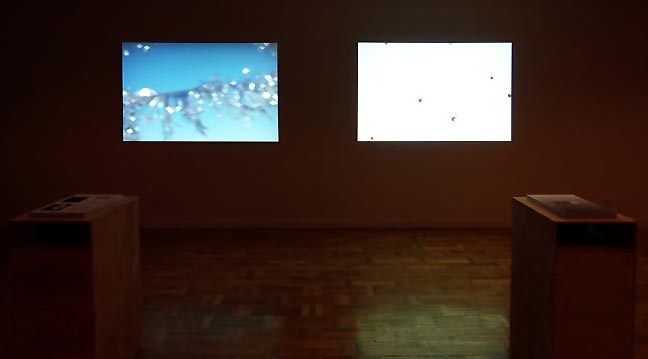 Caitlin Ducey's Heat Waves (L) and Kyle Thompson's HYDRODYNAMICS (R) On the largest wall the first pair of works consists of two videos existing on diametrically different planes. Ducey's Heat Waves is a single channel elegy to the flicker and sparkle of summer. It's sun dappled hex-bokeh flutter provides a warm and languid riviera-esque take on our neighborhood star's more benevolent qualities. The brightness and breezy nature of it all indicates it was probably shot near or on water and the gentle sway has everything in common with Matisse's relaxed later paintings from Nice. This is an exercise in contentment and leisure as the light and other environmental phenomena alluded to are indeed pleasant if fleeting. But I wouldn't say it is soft. It makes no apologies for what it is and if living well is the best revenge then this piece is having the existential last laugh. Its partner is Kyle Thompson's HYDRODYNAMICS video. If Heat Waves is lounging on the beach or by the pool in a bikini with a pina colada in hand then HYDRODYNAMICS with its computer simulation of water molecules loosely interacting with each other is the scientist's kill joy portrayal of how the universe is working on a molecular level all of the time. Simply put, as h2o molecules are exposed to the sun the become more active. It is as dry, workman-like and descriptively dull as Heat Waves is sensual and disconnected from the cares of the world. Together, these options of work/relax are the unavoidable existential Scylla and Charybdis decision of summer. With the favorable weather it seems like a great time to get something done, while at the same time it is perfect for doing nothing and enjoying it. At the end of the summer everyone compares notes and trades stories about how much they did or didn't do and how much fun they had. This forms the existential conceit of the show as work or rest becomes not only unavoidable, but encouraged by the sun's greater presence. Portlanders really take notice of the sun's appearance and yes our summers are incredible. This existential dance continues and becomes more explicit with a second pair of works Ducey's installation Sound and Thompson's multi-part video GROUP THEORY/WE'RE HAVING MUCH MORE FUN. 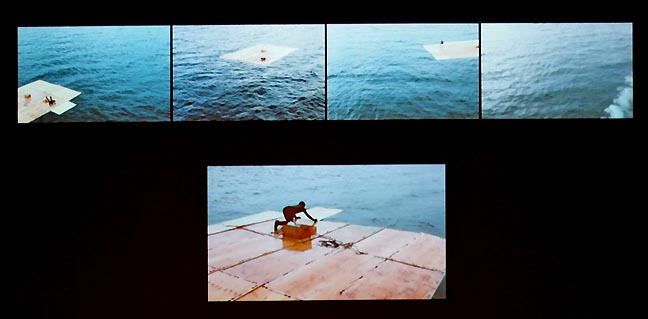 GROUP THEORY/WE'RE HAVING MUCH MORE FUN Of the two Thompson's Group Theory is the most extreme and attention getting. Consisting of up to five windows that document a 2 hour performance of the artist using plywood to create a very rickety looking raft that doesn't resemble a watercraft so much as tsunami debris. The footage shot in Alaska is mesmerizing. In the past Thompson's videos have either documented him hard at work on a structure or focused on water's properties but this time out he combines the two for an impressive piece. Overall, the whole enterprise seems dangerous, yet he's so industrious and doggedly assured in the process that he seems like he's the improbable performance art descendent of Donald Judd and Matthew Barney. The fact that he looks a little like Jackson Pollock in the famous Hans Namuth film doesn't hurt at all. Even the title seems to be a reversal of Pollock and Barney's Drawing Restraint in that the artist revels in the fun/not fun aspect of working on a constantly shifting surface. Had this been chosen for a 5 channel full room display for the 2013 CNAA's it would have been a coup... because it is achingly Northwest and at the same time completely relevant to our attempts to do something/anything in these uncertain times. Missed opportunity... Oh well, Thompson certainly seized the opportunity to make this work and considering his increasingly national profile and excellent work I suspect big things are on the way for this one. I like the fact that this one piece could be a very good solo show. 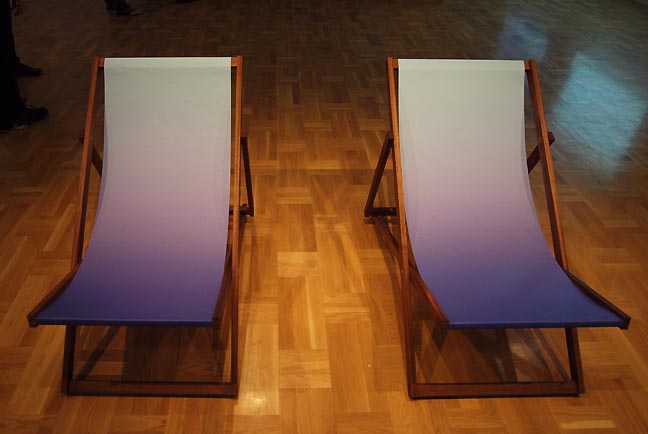 Sound by Caitlin Ducey Group Theory's hilarious counterpart is Ducey's Sound. Consisting of a couple of deck chairs slung with a pleasantly gradated abstract pattern, once again her work has the last laugh as a kind of audience to Thompson's epic folly of activity. Or does it? There is an idle stillness and a lack of momentum to not working... ahhh but these chairs are beautiful in repose, which is its own reward. Clement Greenberg may or may not have enjoyed Ducey's gag, but at this point he's said all he's going to say anyhow. Which reminds me of the sophisticated, yet youthful energy evident everywhere in this show. 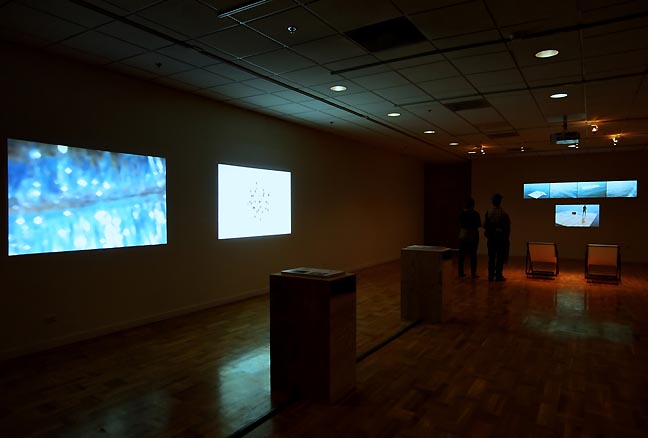 Remote Events and Vanished Objects (Installation View) Installed as a stalemate, both GROUP THEORY/WE'RE HAVING MUCH MORE FUN and Sound are wonderful counterparts... a kind of elegy to summer story without the obnoxious puppy love and coming of age moments. Instead, it is the highly tuned restraint of the show that wins the day. Posted by Jeff Jahn on August 08, 2012 at 16:35 | Comments (0) Comments Post a comment Thanks for signing in, . Now you can comment. (sign out)
(If you haven't left a comment here before, you may need to be approved by
the site owner before your comment will appear. Until then, it won't appear
on the entry. Thanks for waiting.)
|
| s p o n s o r s |
 |
 |
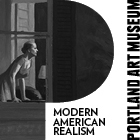 |
 |
 |
 |
 |
 |
 |
 |
 |
 |
 |
 |
 |
 |

|
Site Design: Jennifer Armbrust | • | Site Development: Philippe Blanc & Katherine Bovee | |

